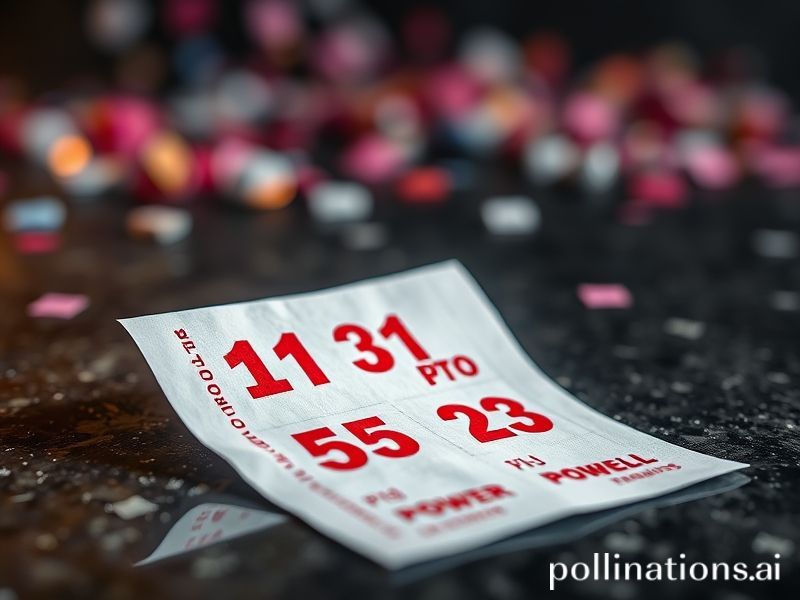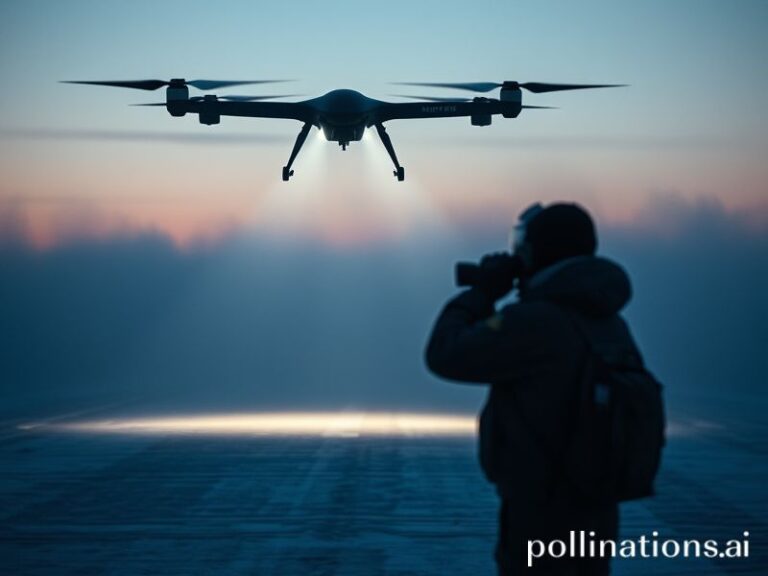Six Numbers Just Shook the Planet: The Global Frenzy Behind Last Night’s Powerball Draw
Powerball Numbers Drop, Earth Tilts Slightly Off Axis
By L. Marceau, Dave’s Locker Global Bureau (somewhere between the duty-free and the existential dread)
The winning Powerball numbers—3, 12, 34, 56, 67, and a Powerball of 9—were announced at 11 p.m. Eastern Standard Time. Within forty-three seconds the news had ping-ponged across undersea cables, leapt over the Great Firewall, ricocheted off Elon’s satellites, and arrived in a Nairobi cyber-café where a man named Otieno realized he was still broke, but now with a browser history full of yacht brochures.
In macroeconomic terms, the jackpot—$1.73 billion pre-tax, $774.1 million if you prefer your windfalls humbled—represents roughly 0.0007% of annual U.S. GDP, or the amount Europe spends on olive oil subsidies in a slow quarter. Yet the numbers carry disproportionate diplomatic weight. The winner will instantly become a larger economy than Samoa, and if they decide to buy citizenship, will rank among the top twenty purchasers of Maltese passports.
From Beijing’s perspective, the draw is a nightly reminder that American soft power now includes the ability to make factory workers in Shenzhen fantasize about retiring in Arkansas. Meanwhile, European regulators look on with the weary envy of a continent that capped lottery jackpots lest they “promote unrealistic expectations.” (The continent still sells cigarettes, but hope apparently needs guardrails.)
In Latin America, ticket-hawking apps have gamified the diaspora: a barber in Quito can now buy a slice of a ticket held by his cousin in Queens, who splits it with the cousin’s roommate, who promised to Venmo his share to his mother in Guayaquil. The potential payout is thus spread across three currencies, two IRS forms, and one WhatsApp prayer chain.
Africa’s crypto evangelists have already launched “PBLO”—a blockchain token pegged to the winning numbers. The white paper promises “decentralized destiny,” which sounds uplifting until you notice the founders hold 40% of the supply and live in Dubai.
Middle Eastern sovereign wealth funds, never ones to miss a volatility party, are reportedly modeling the probability that the winner will park their lump sum in Sharia-compliant REITs. The odds are low, but so were the odds of Qatar buying the World Cup, and here we are.
Back in the States, the numbers have spawned their own cottage industry: data-miners selling “hot/cold” trend reports, astrologers on TikTok blaming Mercury retrograde for 67’s absence since July, and a pastor in Tennessee who claims God told him 9 was “baptismal.” The IRS, ever the silent partner, has already dispatched a SWAT team of accountants whose tactical gear reads “WITHHOLDING AGENT” in friendly Comic Sans.
Globally, the draw is a masterclass in aspirational math. The average human has a 1 in 292.2 million chance of winning, slightly worse than the odds of being killed by a vending machine while being struck by lightning during a shark attack. Yet every culture finds a way to narrativize the ticket: in India it’s a dowry fund, in Australia a down payment on a beach shack, in Russia an exit visa. The jackpot is less a prize than a universal translator for desire—one that speaks fluent delusion in 200 languages.
And when the numbers inevitably fail to match your own, take comfort in the cosmic bookkeeping: the same week the Powerball crowned its monarch, global military spending increased by $2.2 billion—enough to buy every adult on the planet a losing ticket and still have change left over for fighter jets. Somewhere, a statistician is updating the odds that humanity’s next big jackpot will be paid not in dollars but in degrees Celsius.
But for now, the lucky six digits glow on screens from Reykjavík to Riyadh, tiny constellations in the dark comedy we call progress. Play again next week; the universe loves a sequel.







